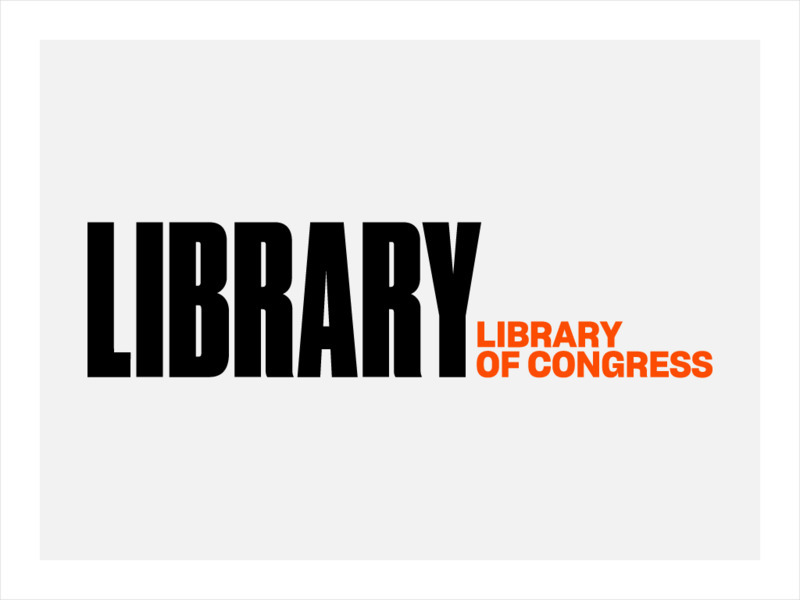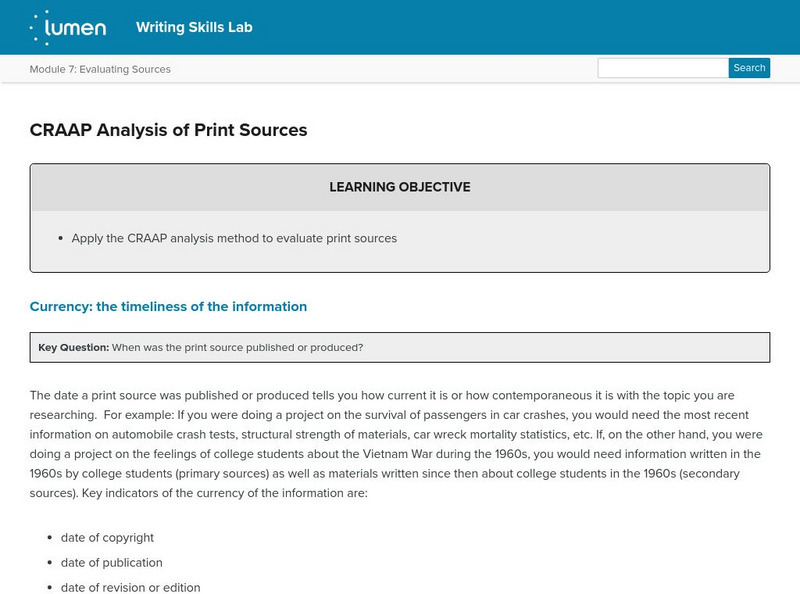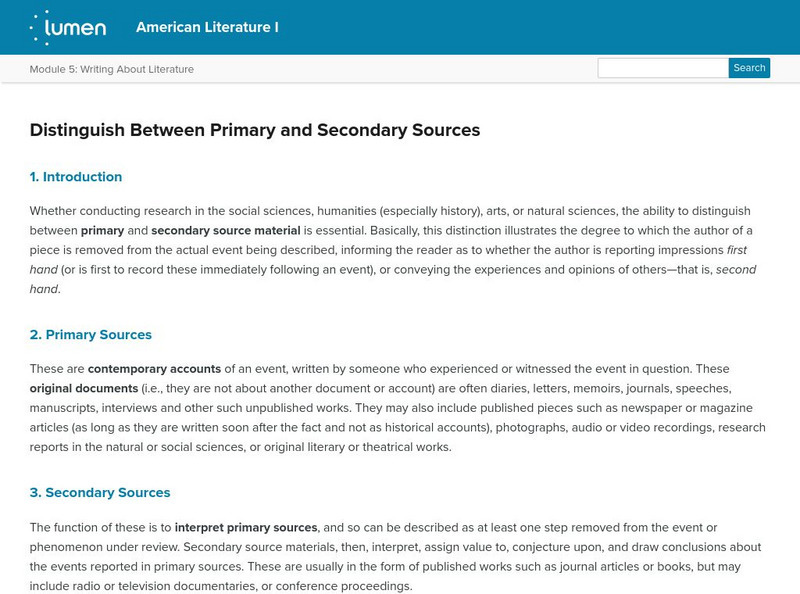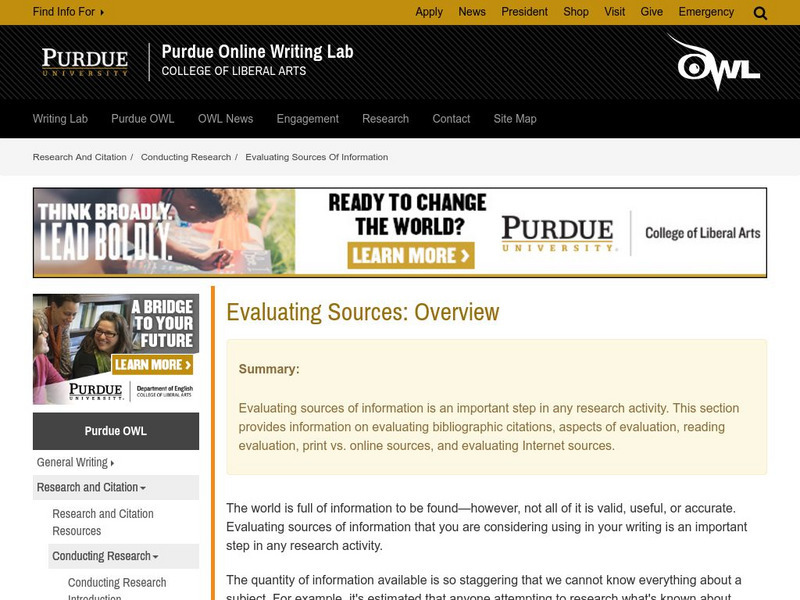Other
Before and After: The New Face of Nightly News
Interesting article follows the return of "hard" news to the 3 evening newscasts from June to October 2001. Includes infographics and source material.
University of California
History Project: Process of Historical Investigation [Pdf]
Outlines the process of historical investigation for students by teaching them the steps of research, analyzing evidence, and making interpretations.
Other
Fair: Retractions of Reporting Are Quite Selective
Interesting essay on the use of unnamed or anonymous sources, accuracy of reports, and retractions of innaccurate reports by major news outlets. Eye opener.
Other
Monash University Library: Evaluating What You Find
This site explains how to evaluate the information you find in your research and provides practice exercises. It includes three sections: Evaluating the reliability of sources, Academic research on the internet, and Evaluating academic...
Library of Congress
Loc: Does the Camera Ever Lie?
A presentation of how photographs were manipulated by photographers during the Civil War.
Lumen Learning
Lumen: Evaluating Sources: Introduction to Types of Sources
This is an introduction to evaluating sources and the types of sources available.
Lumen Learning
Lumen: Evaluating Sources: Craap Analysis of Print Sources
This lesson focuses on evaluating print sources using CRAAP Analysis: Currency, relevance, authority, accuracy, and purpose. A practice exercise is included. W.9-10.8 Sources
Lumen Learning
Lumen: Evaluating Sources: Introduction to Multimedia Sources
An introduction to methods of evaluating multimedia sources.
Lumen Learning
Lumen: Evaluating Sources: Craap Analysis of Multimedia Sources
This activity focuses on evaluating multimedia sources using the CRAAP Analysis: Currency, relevance, authority, accuracy, and purpose. Click on the NEXT button on the bottom right for more information. SL.11-12.2 Eval&Integrate sources
Lumen Learning
Lumen: Distinguish Between Primary and Secondary Sources
This lesson plan focuses on distinguishing between primary and secondary sources and evaluating them. It includes a list of questions to ask to determine the value of the sources under consideration.
Lumen Learning
Lumen: Finding and Evaluating Research Sources
This lesson focuses on how to find, evaluate, and use primary and secondary sources using printed and online sources. It provides practice writing activities such as examining the same topic through primary and secondary sources and...
Huntington Library
Huntington Library: Using Primary Sources in the Classroom [Pdf]
This lesson provides guidelines for teaching students how to use primary sources such as images, text, or statistics (e.g., maps, census). Includes a document analysis worksheet.
Other
The Old Farmer's Almanac
Need information about the weather, history, gardening, or astrology? Look in the Farmer's almanac for much useful information. Enter your city and state to get local weather and more local information.
Other
Library of Congress: Teaching With Primary Sources
This website is an excellent resource for teaching with primary sources. This resource features Holocaust lessons, lesson plan strategies, and podcasts.
US National Archives
Nara: Teaching With Documents: Teaching With Documents
Site from National Archives provides copies of primary documents that can be used while presenting various topics in U.S. history.
Roy Rosenzweig Center for History and New Media
Teaching History: Interactive Historical Thinking Poster (Secondary)
This is an interactive historical thinking poster. History is an argument about the past. Constructing a narrative about history involves several tasks: Analyzing Primary Sources, Examining Source Information,Using Evidence to Support...
W. W. Norton
W. W. Norton & Company: Lit Web: Types and Functions of Secondary Sources
Information about secondary sources as they are used when writing a research essay.
Online Writing Lab at Purdue University
Purdue University Owl: Evaluating Sources: Overview
This entry explains the need for evaluation sources, especially internet sources. W.9-10.6 Techno
Other
Rhetorica Network: Media / Political Bias
A detailed explanation of how bias works is offered at this site, including critical questions for detecting bias in writing.
TED Talks
Ted: Ted Ed: How to Choose Your News
Damon Brown gives the inside scoop on how the opinions and facts (and sometimes non-facts) make their way into the news and how the smart reader can tell them apart. [4:48]
Other
Time & Life Pictures: Defining Visions of an Enduring History
This database of images contains hundreds of photographs from TIME and Life Magazines from a span of over 70 years. This is a wonderful resource for the study of history, culture or photojournalism. Images are searchable by photographer,...
BBC
Bbc Skillswise: Fact or Opinion
As part of the BBC's Skillswise unit, this resource covers the basics of separating fact from opinion through a worksheet, a factsheet, and a quiz.
Other
National Council on Public History: Evidence of the Past
Understand how historians are like detectives- studying evidence from the past.
Online Writing Lab at Purdue University
Purdue University Owl: Primary Research
Learn the difference between primary and secondary research as well as some different types of primary sources that can be used when gathering research.



















